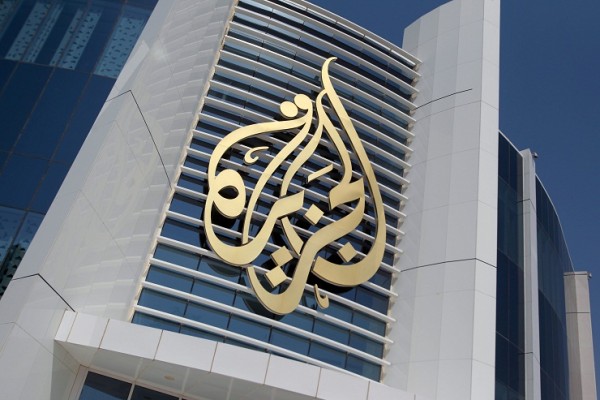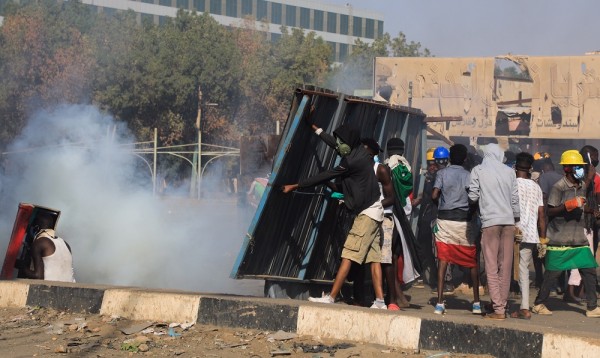In the days since the world celebrated World Press Freedom Day the Sudanese press has witnessed great setbacks. On May 3, the entire print run of Al Midan newspaper was confiscated by Sudan’s National Security and Intelligence Services (NISS) and it happened again on May 6, May 8, May 10, May 13 and May 15. Al Jarida newspaper was confiscated on May 1, May 2, May 6, May 11, May 12 and May 14.
On May 1 and May 2, the NISS confiscated Al Jarida newspaper under the pretext that the paper had covered specific topics considered “red lines” that should not be addressed. Security officers visited the newspaper and asked for a copy to review before printing, deleted many of the articles, and gave approval to print the paper. But other security officers at the printing press company objected and they confiscated the paper.
“The list of red lines increases every day,” Idris al-Domah, managing editor of Al Jarida paper, said. He added: “We usually adhere to the security instructions; we did not go beyond them one day, but they are always preventing the paper from being printed. We do not know what the reasons behind these deliberate disruptions are.”
He added: “We think that Al Jarida was and still is being targeted by the security services, but we have no idea what the reasons for this targeting are.”
On Sunday, May 6, NISS confiscated both Al Midan and Al Jarida newspapers. On May 7, Al Tayar was confiscated. On May 8, Al Midan was confiscated for the third time, which meant that distribution of all three editions produced that week was prevented.
The confiscations usually take place after the newspapers are printed and the costs have been paid to the printing press, in order to inflict the heaviest possible financial loss on the publisher. The result is that the publisher eventually stops, or alternatively chooses to follow the guidelines set by the NISS, and doesn’t cover issues of concern to the public considered by security to constitute “red lines”.
There are various forms of security control over newspapers, including phone calls to the editors ordering them not to publish reports on certain topics.
“I received a phone call from NISS on the evening of Saturday, May 5,” said Madiha Abdullah, the editor of Al Midan newspaper. “They told me over the phone: You should not include in your paper any articles critical of the performance of the security services, armed forces, or the police, and do not criticize the President; in addition do not talk about the situation of civil liberties and press freedoms. And do not talk about the problems in the State of Gadarif or the dismissal of its governor.”
She added: “In the early stages they told us not to criticize the performance of the army, or abuses by the police and security services … . But usually we did not adhere to those guidelines because they are restrictive and many violate our right to publish and the right of people to receive information.”
Idris Al Domah, managing editor of Al Jarida newspaper, said: “We receive phone calls every evening from the NISS, the press division, determining the topics we should not be covering.” He added: “We were told not to criticize the President, not to criticize the institution of the presidency, not to criticize the security services, the armed forces and police, and not to deal with human rights violations and abuses committed by the regular forces; these are the regular red lines that we should not address. This is in addition to the topics of emergency such as the crisis in Gadarif state and the crisis in the Ministry of Information and the resignation of the minister of information, corruption issues, lack of services, and the debate about the Constitution.
“They requested that we not talk about the confiscation of the newspaper, not talk about security control of newspapers and the media. In short, we should write according to the accepted narrative of the security services.”
The task of the press – as the fourth estate – is to monitor government performance and expose corruption and human rights violations committed by the various state agencies, including the security apparatus. But Sudan’s security apparatus wants the press to have a different task, to work as a publicity or propaganda machine in favor of the ruling party in order to extend the life of the regime.
There is an economic war by the government, well planned and implemented by the NISS, to curtail the role of the press. The war started with government advertisements being kept out of critical and independent newspapers. It was obvious that advertising is a major source of income for the newspapers. For example, Al Midan newspaper has not received any government advertising since the start of 2007.
The second phase of the war was the confiscation of newspapers after printing, and here they suffered significant financial loss, because the papers nonetheless pay all printing costs. But the NISS usually intervenes, inflicting considerable financial losses. The newspaper loses between 10,000 to 15,000 SDG – equivalent to $3,300 – $5,000 U.S. dollars. This reflects merely the cost of printing, excluding other operating costs such as rent, salaries, travel and advertising costs. Confiscation of newspapers leads to low morale amongst the staff, and decreasing confidence among readers as a result of the unexplained repeated disappearances. Worst of all, the paper is unable to inform the readers about the reasons for not publishing, as the government does not allow any newspaper to address the issue of censorship.
The NISS currently violates freedom of expression in several ways: confiscation of newspapers after printing, security prosecutions, arrests of journalists, interrogations by the security services, and by preventing journalists from writing.
The NISS summons journalists to its offices on a daily basis in order to humiliate them and keep them from doing their work. The journalist Haider al-Mokashfi, consultant editor at Al Sahfa newspaper, said: “On Tuesday, April 25, my article was blocked. It dealt with the incident of the burning of a church in Khartoum by militant Islamists. I knew that the article had been blocked from the paper by the security apparatus, and at noon I received a phone call from National Intelligence and Security asking me to come to their offices on the same day. I stayed the whole day at the offices of security, and they interrogated me about the article and other articles, and they told me verbally that I was banned from writing. When I returned to the newspaper office, the editor told me that my article would not be published because the Security Service had phoned and had told him they had suspended me from writing!”
A total of 15 journalists have so far been banned from writing.
Meanwhile, since April 15 well-known journalist and university media lecturer Faisel Mohamed Salih has been asked to come to the NISS office on a daily basis, because of his critical comments on Al Jazeera TV about a presidential speech that called for war with the South.
Salih said: “The Security agents came to my house and my office more than once during Wednesday April 25. I was outside the house.
“Around eight in the evening they came to my house once again and I spoke to them through my wife’s phone. They told me I was wanted by the NISS and I met them outside and I went with them to the NISS office in Khartoum North.
“I was questioned about my comment on Al Jazeera TV on April 19 about the President’s speech in Al Obied city. There was not much to talk about, as they have video footage of my comment. I repeated to them what I said in that comment again.
“Their argument was based on several points: that such a comment should not be said in the media, and that it was better for me to convey any views to those responsible by other means, that I should be cautious when talking to foreign media, that I should restrict some of the issues in the local media, and that some of the words used were indecent.
“I refuted their arguments; the questioning, however, continued till midnight. They requested that I come back on April 26 for further interrogation; they called it ‘discussion’. After that, they requested that I come to their office every day from the morning till 5.00 pm. I have to sit in the reception area without any questions or answers, then they ask me to come the next morning.”
Salih had been going to the security office for 11 days. On the twelfth day he decided not to go and publicised his predicament with the NISS on online websites. The NISS arrested him on May 8 and he stayed at the NISS office for nine hours before being released with a request that he return the next morning. When he didn’t return, they arrested him again.
Salih’s arrest is an indication that the NISS not only wants to block information from the Sudanese people but from the whole world.
The government wants to exploit the state of war with the South to justify further restrictions on freedom, punish critical journalists and newspapers and distract people’s attention from the deteriorating living standards in Sudan.
Abdelgadir Mohammed Abdelgadir is a freelance journalist and press freedom expert based in Khartoum, Sudan. He is the author of “Walls of Silence: Systematic Practices to Repress Press Freedoms, Freedom of Opinion and Expression in Sudan,” which can be downloaded in Arabic here. (linkto: http://www.sudan-forall.org/sections/ihtiram/pages/ihtiram_issue13/pdf_files/Abdelgadir-Mohamed-Abdelgadir-part-1.pdf). An English version is expected soon.
The opinions and views expressed in this article are those of the author and do not necessarily reflect those of the International Press Institute.


